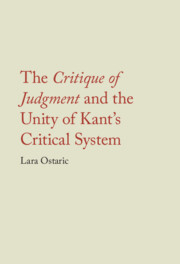Book contents
- The Critique of Judgment and the Unity of Kant’s Critical System
- The Critique of Judgment and the Unity of Kant’s Critical System
- Copyright page
- Contents
- Acknowledgments
- Note on Sources
- Kant’s Writings by Abbreviations Used for German Titles with Corresponding Translations
- Introduction
- Part I The Highest Good and the Postulates
- Part II Aesthetic Judgment and the “Moral Image”
- Chapter 4 Beauty as a “Symbol of Morality”
- Chapter 5 The Free Harmony of the Faculties and the Primacy of Imagination in Kant’s Aesthetic Judgment
- Chapter 6 Genius, Ugliness, and Nonsense
- Part III Teleological Judgment and the “Moral Image”
- Bibliography
- Index
Chapter 4 - Beauty as a “Symbol of Morality”
The “Moral Image” of the “Supersensible Without”
from Part II - Aesthetic Judgment and the “Moral Image”
Published online by Cambridge University Press: 15 August 2023
- The Critique of Judgment and the Unity of Kant’s Critical System
- The Critique of Judgment and the Unity of Kant’s Critical System
- Copyright page
- Contents
- Acknowledgments
- Note on Sources
- Kant’s Writings by Abbreviations Used for German Titles with Corresponding Translations
- Introduction
- Part I The Highest Good and the Postulates
- Part II Aesthetic Judgment and the “Moral Image”
- Chapter 4 Beauty as a “Symbol of Morality”
- Chapter 5 The Free Harmony of the Faculties and the Primacy of Imagination in Kant’s Aesthetic Judgment
- Chapter 6 Genius, Ugliness, and Nonsense
- Part III Teleological Judgment and the “Moral Image”
- Bibliography
- Index
Summary
The aim of this chapter is to show how objects of beauty in the world indirectly exhibit the supersensible “without,” that is, the Idea of the highest good. This I take is the meaning of Kant’s claim that beauty is a “symbol of morality.” The fact that the experience of beauty serves as a sign that the world may be hospitable for the realization of the highest good can have a merely psychological significance, namely, that of maintaining the existent moral disposition. Yet, the significance of this sign can move beyond its merely psychological effects insofar as it reinforces the view that the final end must be the end of nature. The experience of beauty renders the Idea of the highest good objectively real in a special way, which adds the cognitive dimension to aesthetic experience that is best explained in proximity to Kant’s notion of practical cognition.
- Type
- Chapter
- Information
- The Critique of Judgment and the Unity of Kant's Critical System , pp. 101 - 122Publisher: Cambridge University PressPrint publication year: 2023



